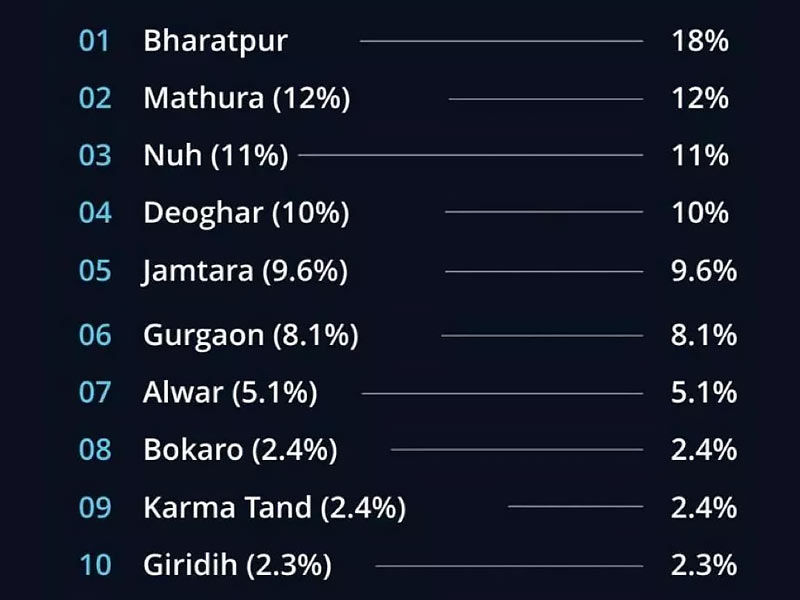According to a recent report by an IIT Kanpur-incubated startup, Rajasthan’s Bharatpur and Uttar Pradesh’s Mathura have supplanted Jharkhand’s Jamtara and Haryana’s Nuh as the notorious hubs of cybercrime in India. The report also found that only the top 10 districts account for 80% of all cybercrimes in the nation.
The Future Crime Research Foundation (FCRF) has included the data in its most recent thorough white paper, “A Deep Dive into Cybercrime Trends Impacting India.”
According to the FCRF, the main contributors to cybercrime instances in India are Bharatpur (18%), Mathura (12%), Nuh (11%), Deoghar (10%), Jamtara (9.6%), Gurugram (8.1%), Alwar (5.1%), Bokaro (2.4%), Karma Tand (2.4%), and Giridih (2.3%). These cities account for 80% of recorded incidents.
“Our analysis focuses on the top 10 Indian districts where cybercrime is most likely to occur. As noted in the white paper, developing successful prevention and mitigation methods requires an awareness of the major causes of cybercrime in these areas, according to FCRF cofounder Harshvardhan Singh.

The examination of the top 10 cybercrime hotspots (districts) in India, according to him, indicates several common elements that contribute to their vulnerability, including closeness to important urban centers, a lack of adequate cyber security infrastructure, difficulties with the economy, and low levels of digital literacy.
To lower cybercrime rates in these districts and improve India’s overall cyber security environment, Singh continued, “Addressing these factors through targeted awareness campaigns, law enforcement resources, and educational initiatives is crucial.”
While established cybercrime hotspots continue to pose serious concerns, the FCRF study found that newly emerging hotspots require attention and proactive steps from both individuals and the government.
According to the report, these areas are those where various types of cybercrime are increasing and frequently catching both the public and law enforcement agencies off guard.
Criminals can create false identities thanks to insufficient Know Your Customer (KYC) and verification procedures on online platforms, which makes it difficult for law enforcement to identify them. Thugs are also given easy access to fake accounts and rented SIM cards on the black market, which makes it more difficult to find and prosecute them.
Also read: Micron begins construction of $2.75 billion semiconductor packaging plant in Sanand
Virtual private networks (VPNs) give cybercriminals anonymity, making it difficult for authorities to trace their online presence and location. Additionally, the affordability of AI-driven cyberattack tools empowers criminals to automate and scale their attacks, increasing their efficiency.
The FCRF also warned that cybercrime gangs recruit and train jobless or underemployed people, developing a pool of potential criminals.


























